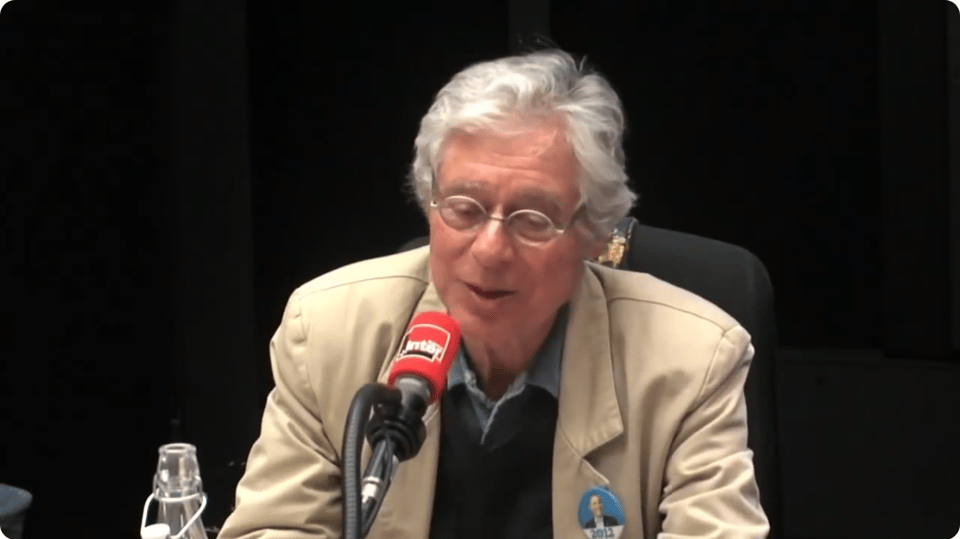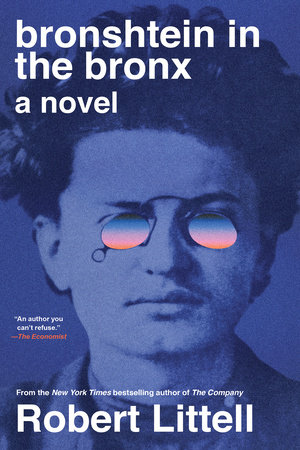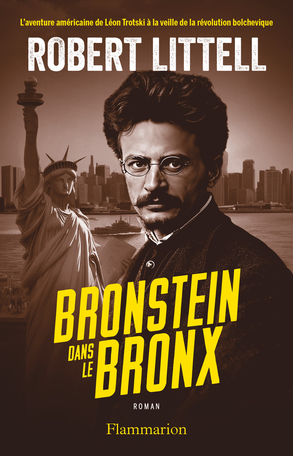The Crime Lady: A Few Questions for Robert Littell
Dear TCL Readers:

A few years ago, deep into the pandemic, I decided it was time to acquaint myself with the complete works of Robert Littell. While I’d written about Eric Ambler, Helen MacInnes, and John Le Carre, and had read a lot of Charles McCarry, somehow Littell had flown under my radar, likely because I hadn’t had the energy to tackle his 2002 masterwork The Company, clocking in at about 900 pages, and so neglected the rest of his body of work.
But the pandemic gave me nothing but time, especially after finishing edits on Scoundrel, and so I read nearly everything Littell had published in book form. What I found cemented my newfound opinion that he was America’s greatest living espionage novelist, and that he remained criminally underrated. I made my case in an essay for Inside Hook that I still am quite proud of — even if I was, blessedly, flat wrong about Littell’s then-latest novel, Comrade Koba, being his last
As I wrote four years ago, “I did not anticipate that Littell’s body of work would be so Jewish. Spycraft is the basis for a larger project on the price of assimilation, where the act of becoming someone else, as required when taking on a CIA-produced legend, has roots in the massive waves of immigration coming through Ellis Island in the first part of the 20th century.” (Littell demurred when I asked him about this: “if you detect a larger project -- a larger theme! -- in my novels, I myself have not consciously organized this...The only larger project I am aware of -- or will admit to! -- is, in the words of that marvelous novelist William Gass, to create a world as opposed to describing it. I also subscribe to the Graham Greene dictum about novels being entertainments.”)
Littell’s work speaks to me so deeply, in a way that the work of the other great espionage novelists cannot, because the specifics of the worlds he created overlap with my own. Even his newest novel, Bronshtein in the Bronx — not spy fiction, but also not not spy fiction — unwittingly intersects with my family history, as my great-great aunt Bryna Bercovitch, whom I discussed in my previous newsletter, was an ardent Communist (and devoted Trotsky follower) until disillusionment finally set in around 1936.
Bronshtein, set in the ten weeks Trotsky spent in New York City in 1917 before the Russian Revolution called him back to the country of his birth, is as mordantly funny and wickedly ironic as Littell’s earlier novels. But it’s also even more haunted by family ghosts, particularly that of his father, Leon.

Littell kindly answered my questions about Bronshtein in the Bronx, published today in the US and last November in France, via email. The conversation has been condensed and edited for clarity. I should also note that our exchange took place the weekend before the inauguration.
The Crime Lady: Let's start with the foreword, in which you admit to a "curious obsession" with Leon Trotsky, and the connection his nom de guerre had with your father, Leon Litzky. When did you first learn that your original family name was Litzky and not Littell, and how did that provoke this obsession?
Robert Littell: I just slipped stealthily past my ninetieth birthday (a milestone that reminded me that I'd slept for roughly thirty years), but it seems to me I have known about Litzky-Littell as far back as I can remember. My stepdaughter has called me "Litzky" (not bothering with Bob) for the 49 years she's been my stepdaughter, so Litzky was obviously in the family air. Before my father (born in New York in 1896) died, which was in 1989, he gave me the legal papers that he filed in 1919 to change his family name from Litzky to Littell.
In the court filing, he complained to the judge about being the butt of jokes and the victim of ridicule because of the similarity of his name (Leon Litzky) to that of the Russian revolutionist (as such people were called in those days) Leon Trotsky, who had spent ten weeks and two days in the Bronx before the 1917 Bolshevik Revolution. So from an early age I was aware of my father's disparagement of Trotsky, both for his Bolshevik mindset and his subsequent "ends justify means" brutality during and after the Bolshevik Revolution -- and, on a more personal level -- because their life lines had crossed, in a manner of speaking, in a New York courthouse.
TCL: By the same token, you've written around Trotsky, but never about him directly as the main character of a novel. So why Bronshtein, and particularly, why tackle him in fictional form now, finally, in the stylistic manner that you chose? This isn't a conventional historical novel about Trotsky, but perhaps a Rhapsody (or Fantasia) on a theme of, to torture a musical metaphor...
RL: I was drawn to the idea of doing the research and writing a novel on Bronshtein when I began to reflect on where he went off the rails. I suspect that the young Bronshtein, born to Jewish parents and raised on a farm in Ukraine, started out as an idealist rebelling against the injustices inflicted by an autocratic Tsar and the inequalities rampant in the capitalist structure of Russia's economy. The communists I have personally known were all idealists at the start: they were repelled by early capitalism's worst aspects (slave-labor wages, child labor, long workdays and work weeks, the utter lack of sanitation and medical care and retirement plans) and, later in the 1930s, these same idealists were eager recruits in the struggle against fascism. (One of the only ways to actively oppose fascism before World War Two, as the Spanish Civil War in the late thirties brought home, was to join the communist anti-fascist front.)
But these same idealists who risked their careers and in some cases their lives to combat fascism at some point because disillusioned with Stalin's bloodthirsty and ruthless conception of communism and, for the most part, quit the Party. I wondered where Trotsky fit in to this scenario. If he started out as a young anti-Tsarist idealist, as I suspected, where did he go wrong? Why did he support Lenin's Red Terror during the brutal Russian Civil War that followed the Bolshevik Revolution, which led to tens of thousands of executions of people that the Bolsheviks considered to be enemies -- or potential enemies? Why did he favor collectivization of agriculture which, when Stalin imposed it in 1929, led to millions of deaths and deportations?
My eventual conclusion was that at some point Bronshtein parted company with his conscience -- what Freud called the superego, the little voice in our brains that helps us navigate the complexities of the world we live in. More accurately, his conscience parted company with Bronshtein when he quit New York and returned to Petersburg to organize the details of the revolution that Vladimir Ilyich Lenin inspired.
TCL: Speaking of conscience, Bronshtein does have this invented nemesis who cuts in as the voice of reason -- or bucket of cold water -- on Trotsky's most fanciful ideas and thoughts. . .
RL: Yes, it tickled me to portray my father, Leon Litzky, as Bronshtein's conscience -- you might call it Leon Litzky's revenge on his nemesis, carried out in his son's imagination!

TCL: Bronshtein is also very funny -- like when Trotsky's kids are making fun of him, when he's getting into fights with (Forverts founder) Abraham Cahan, when Litzky-as-conscience is castigating him, and when he is having troubles with women. Revolution is a serious business most of the time, but it's also pretty absurd, and I wondered how entertaining it was for you to poke holes in what people often associate with radical leftist rhetoric.
RL: I did have great fun imagining -- inventing! -- what transpired during Bronshtein's ten weeks and two days in New York. He set foot in the new world (with his companion and their two young sons) hoping to spark a socialist revolution in capitalist America, on the theory that if he could provoke the workers to revolution somewhere -- any revolution would do -- it would be contagious and the workers of the world, inspired by the revolution Bronshtein provoked, would rise up everywhere: Germany, England, France, Russia were in Trotsky's sights. He called this concept "Permanent Revolution." What Bronshtein discovered, however, was that American workers were a lumpen proletariat, far more interested in higher wages and shorter working hours and paid vacations than revolution. In short, they wanted a larger piece of the capitalist pie.
As for Bronshtein's women problems: he was, in real life, something of a skirt chaser. After his split with Stalin and his exile from Stalin's Soviet Union in 1929, Bronshtein and his companion wound up in 1940 -- after meandering through several countries -- in Mexico, where he was welcomed by two prominent and ardent Communists, the painter Diego Rivera and his beautiful artist wife Frida Kahlo, at which point Trotsky had a roaring love affair with Frida that only ended when she quit him. It was this love affair in Mexico that inspired me to invent a love affair in New York with a feminist journalist with Mexican roots named Frederika.
You hit the nail on the head when you suggest that the nuts and bolts of making a revolution can be pretty absurd. I suppose that these absurdities account for the humor in a novel about a character like Bronshtein, living in the Bronx and commuting daily on the Third Avenue Elevated to Greenwich Village where, working out of a basement for a Russian language newspaper, he tried to ignite a socialist revolution in America. On the surface it sounds like a skit from Saturday Night Live.
TCL: Whenever I read about revolutionary types in the past, my inner skeptic kicks in because humans are still going to behave in the same craven, selfish, too often sexist ways. How conscious were you of contemporary parallels while working on Bronshtein?
RL: Sarah, what's going on in America today -- what you call contemporary parallels -- is never far below the surface in my way of looking at an historical event, and in my way of dramatizing it in a novel. Wait and see: the literary world in years to come will be inundated with novels inspired by the absurdities of today's American political scene.
Mr. Trump has said that America is the laughing stock of the world. He's right -- but not for the reasons he thinks. The world is laughing at America -- but it's very nervous laughter, as people worry themselves sick that what happened and is happening can be contagious. (And when you look around the world, has been contagious.) American politics has become a caricature of what previously passed for adult statesmanship; in my mind's ear I hear unruly children squabbling in a school yard. "It's mine!" "No, it's mine." "You're a liar!" "You're another!" "I'm rubber, you're glue, everything you say bounces of me and sticks to you!"
TCL: This segues naturally to my final question for you. It’s a precipitous time: a new American administration set to wreak havoc and chaos, a ceasefire, hopefully permanent, starting in the Israel-Gaza war. And I can't help but think anew of the line in The Company that I quoted in my essay on your work: "The Cold War may be over but the great game goes on." How many more literary moves do you feel ready to make after Bronshtein, and what keeps you tethered to literature still?
RL: I am actually working on a new novel, which I think will be my last novel -- though my wife points out that I've said this about the last ten of my twenty-two published novels. I think she is mistaken; I've said this only about five of my last published novels. What keeps me writing? My great friend, the extremely talented Timothy Ryback (author of Takeover: Hitler's Final Rise to Power) claims that there are three kinds of writers: Those who write, those who can't write, and those who can't not write. I am embarrassed to say I identify myself as a charter member of this third category.
**
Thanks, as always, for reading. Until next time, I remain,
The Crime Lady